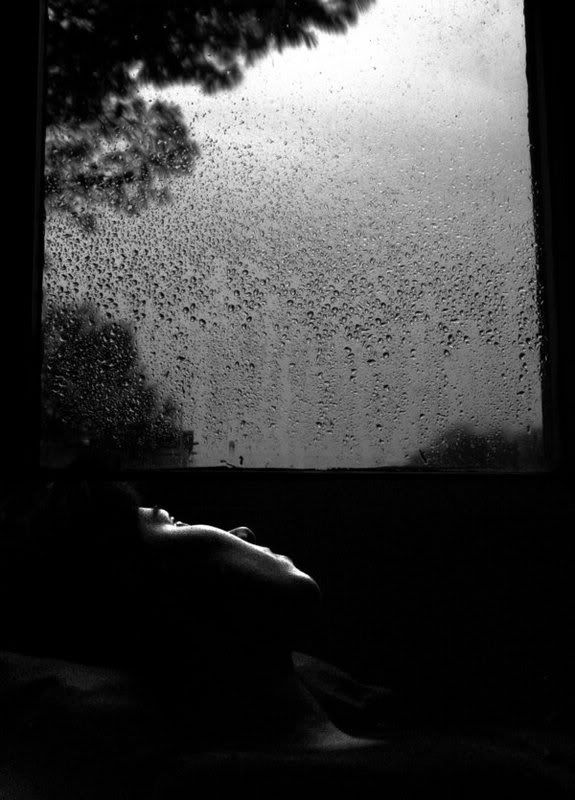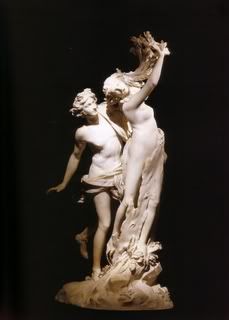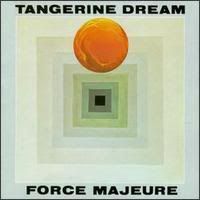Friday, August 09, 2013
The Birds
The birds are wonderful.
Their curves express the essence of nature;
Their grace the spirit of beauty.
I am sorry for her broken wing.
Limping away, she tried and tried,
To forever reach and touch the sky.
She turned her head to seek her aid,
and I came and helped to begin her day.
I taped her wing to be at one piece.
She looked up slowly to thank me,
"You will not be forgotten."
And so I let her go - my hands filled with nothing.
And yes she flew! She flew so high,
Not her feathers but her wings and spirit flew.
My joy induced my eyes wide and smile ever wider.
Until something fell from above, to ruin my day.
Tuesday, July 10, 2007
My Dear Love Emily, Sweet Dreams
I have imagined your life to be blessed by an angel. By your human spirit, I cannot deny your purity. Your adoration for the moors, the rain, the speculations of ghouls and ghosts, and the melancholic distress of living and loving sets me into an intellectual curiosity for the rest of my days. What is right for love to prosper? What are "soulmates", between man and woman, if they are destined to perish together? If you were here, beside me, I would have eternally loved to speak to you, my dear Emily...
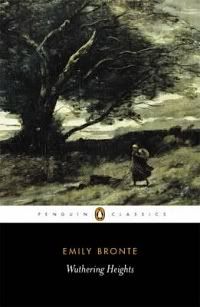 Wuthering Heights was published in 1847 and written by Emily Brontë. It is a complex tale of love, desire, and tragedy, along with twists and turns along the way. The story revolves around the history of childhood friends Heathcliff and Catherine Earnshaw who have fallen in love, and their relationship with two families, the Lintons and Catherine's family proper. Heathcliff was brought in to the Earnshaws as an orphan and raised by the maternal family servant Nelly, but he was a troublesome fellow. He met Catherine and have spent much of their time together running and playing in the moors. Until master Earnshaw had gotten strict upon Heathcliff, damaging his relationship with Catherine, the young boy began planning revenge on him. That's as far as I will take it. It is a sad story though.
Wuthering Heights was published in 1847 and written by Emily Brontë. It is a complex tale of love, desire, and tragedy, along with twists and turns along the way. The story revolves around the history of childhood friends Heathcliff and Catherine Earnshaw who have fallen in love, and their relationship with two families, the Lintons and Catherine's family proper. Heathcliff was brought in to the Earnshaws as an orphan and raised by the maternal family servant Nelly, but he was a troublesome fellow. He met Catherine and have spent much of their time together running and playing in the moors. Until master Earnshaw had gotten strict upon Heathcliff, damaging his relationship with Catherine, the young boy began planning revenge on him. That's as far as I will take it. It is a sad story though.
What intrigues me most is Emily's writing. She writes as if each sentence is a lyric from a poem, and at times I have felt some rhythm. I would say that it is one of those rare novels, next to reading Pale Fire by Vladimir Nabokov, where I would study the literature to improve myself. Her prose is seemless and the structure of the story is quite innovative. While I was reading the book I amazed myself when I realized how complex it had gotten when the narrators shifted from character to character, being "deeper and deeper" within the story, giving you a natural feel. Emily is highly descriptive to achieve her ambiance and mood. It is wonderful and delicious literature, especially reading in a rainy day, or a lonely night.
The book was published in 19th century Victorian era who some writers, such as Edgar Allan Poe and Nathaniel Hawthorne, focused on the Gothic or Dark Romantic genre. There are allusions to the supernatural such as ghosts and demons, but Emily writes in a style that is not explicit. That is, when a character encounters a strange occurrence, she lets the reader know that the character feels the encounter to be that way, and she doesn't let herself describe the experience as something concrete.
In the end, the novel is a joy of a read. I believe this is good to pick up when you are going through, perhaps, some sadness in life. There is a point when you would like to escape that certain sadness and you will end up not being yourself. You will be happy without even knowing why you are happy. The best to do is to embrace your sadness, and move on to the next phase. I was walking to my house, not too long ago, after reading by the ocean under a tent as the day rained softly throughout the afternoon, and said to myself, "I love love, but love is sad." It is that moment when I realized that I'm trying to help myself get better. Let's just hope that it won't be for too long in that neutral state of mind.
The first song is more cheerful, yet sad. The second and third songs are in Spanish but they follow similar themes. Enjoy your day!
Stevie Wonder - My Cherie Amour"Proud people breed sad sorrows for themselves."
 Wuthering Heights was published in 1847 and written by Emily Brontë. It is a complex tale of love, desire, and tragedy, along with twists and turns along the way. The story revolves around the history of childhood friends Heathcliff and Catherine Earnshaw who have fallen in love, and their relationship with two families, the Lintons and Catherine's family proper. Heathcliff was brought in to the Earnshaws as an orphan and raised by the maternal family servant Nelly, but he was a troublesome fellow. He met Catherine and have spent much of their time together running and playing in the moors. Until master Earnshaw had gotten strict upon Heathcliff, damaging his relationship with Catherine, the young boy began planning revenge on him. That's as far as I will take it. It is a sad story though.
Wuthering Heights was published in 1847 and written by Emily Brontë. It is a complex tale of love, desire, and tragedy, along with twists and turns along the way. The story revolves around the history of childhood friends Heathcliff and Catherine Earnshaw who have fallen in love, and their relationship with two families, the Lintons and Catherine's family proper. Heathcliff was brought in to the Earnshaws as an orphan and raised by the maternal family servant Nelly, but he was a troublesome fellow. He met Catherine and have spent much of their time together running and playing in the moors. Until master Earnshaw had gotten strict upon Heathcliff, damaging his relationship with Catherine, the young boy began planning revenge on him. That's as far as I will take it. It is a sad story though.What intrigues me most is Emily's writing. She writes as if each sentence is a lyric from a poem, and at times I have felt some rhythm. I would say that it is one of those rare novels, next to reading Pale Fire by Vladimir Nabokov, where I would study the literature to improve myself. Her prose is seemless and the structure of the story is quite innovative. While I was reading the book I amazed myself when I realized how complex it had gotten when the narrators shifted from character to character, being "deeper and deeper" within the story, giving you a natural feel. Emily is highly descriptive to achieve her ambiance and mood. It is wonderful and delicious literature, especially reading in a rainy day, or a lonely night.
The book was published in 19th century Victorian era who some writers, such as Edgar Allan Poe and Nathaniel Hawthorne, focused on the Gothic or Dark Romantic genre. There are allusions to the supernatural such as ghosts and demons, but Emily writes in a style that is not explicit. That is, when a character encounters a strange occurrence, she lets the reader know that the character feels the encounter to be that way, and she doesn't let herself describe the experience as something concrete.
In the end, the novel is a joy of a read. I believe this is good to pick up when you are going through, perhaps, some sadness in life. There is a point when you would like to escape that certain sadness and you will end up not being yourself. You will be happy without even knowing why you are happy. The best to do is to embrace your sadness, and move on to the next phase. I was walking to my house, not too long ago, after reading by the ocean under a tent as the day rained softly throughout the afternoon, and said to myself, "I love love, but love is sad." It is that moment when I realized that I'm trying to help myself get better. Let's just hope that it won't be for too long in that neutral state of mind.
The first song is more cheerful, yet sad. The second and third songs are in Spanish but they follow similar themes. Enjoy your day!
Soraya - Las Ruinas en mi Mente
Franco Simone - Rio Grande
Tuesday, June 19, 2007
Let's Look Out the Window
I can only imagine myself looking outside the window as the rain falls, watch the many mirrors on the lonely street, and the city lights being lonely with me. I want to smell the soil if I wish to take a walk outside my house along with my black umbrella, kicking the floor with my shoes softly. The trees will seem like they have their backs facing me, letting me think more about the ocean nearby and become ever more sensitive to the breeze.
Do I want to be happy to be oblivious? Or do I want to be sad to love again? How many times should I wonder when the rain will fall? I wish I could do this once every year or so. I think about it every night.
The rain would fall like whispers, and the raindrops serenade my happy memories; my past joys. The raindrops speak to me as they die off onto my umbrella. And the green leaves brisk each other from the soft winds as if they loved each other, and laughed together under a shining moon. The raindrops would creep to my arms and hands, to fall once again and never be remembered...
There is nothing more to say. It would be a moment of moments.
I wish it rained outside my window.
Goodnight.
Monday, May 21, 2007
Video Game Music from the 16-Bit Era

Hybris (1987) title screen from the Commodore AMIGA
My brother always thought it would be a cool thing for me to gather music from Commodore AMIGA. The AMIGA was the most advanced computer gaming system for its time when it debuted in 1985. So, in following his suggestion, I began to do research and tried to remember the best games from my youth. It later came to me and wondered, "What if I tried to find the best, melodic, sophisticated, video game music from the main leading systems from the day AMIGA debuted to the end of the Super Nintendo in 1999?"
During October of last year I finally compiled, and mostly recorded, over 40 tracks from the major video gaming systems from 1988-1996: Commodore AMIGA, Super Nintendo, and SEGA Genesis/Megadrive. I heard these songs extensively, found some sounds to fit-in for interludes as if it was an album made by one musical group. I tried to make it as consistent as possible, in that one track "logically" follows the next, considering that the technological/musical shifts over the years got better and better.
Each song was personally hand-picked in this way as I felt that the song itself stood out, and it didn't require the gameplay to support it. It is amazing that music so old, so stereotyped as music for "big kids", would have so much complexity and sophistication. As you analyze the music, you can tell that the tracks were done by someone who had good taste, and knew what was being composed. Enjoy!
Each song was personally hand-picked in this way as I felt that the song itself stood out, and it didn't require the gameplay to support it. It is amazing that music so old, so stereotyped as music for "big kids", would have so much complexity and sophistication. As you analyze the music, you can tell that the tracks were done by someone who had good taste, and knew what was being composed. Enjoy!
The stars next to the song are my personal favorites.

Commodore AMIGA (1985-1994)
1. Turrican (1990) - Launch (0:15)
2. Turrican (1990) - Title Screen (4:29)
3. Project X (1992) - Title Screen (Rave) (2:11)
4. Hybris (1987) - Title Screen* (2:30)
5. B.A.M. (composer, 1990) - Hack Screen (2:27)
6. Lotus 3 (1992) - Intro/Menu Screen (3:36)
7. Ork (1991) - Title Screen* (3:16)
8. The Apprentice (1990) - Options Screen* (1:17)
9. Neuronics (1992) - In-Game (5:06)
10. Bloodmoney (1989) - In-Game (1:32)
11. Megatraveller 2 (1992) - Title Screen (4:15)
12. Crystal Hammer (1988) - Title Screen* (2:41)
13. Chaos Engine (1993) - Interlude (1:40)

Super Nintendo (1990-1999)
14. Kirby Super Star (1996) - Rude Awakening (ambient) (0:27)
15. Donkey Kong Country 2 (1995) - Enchanted Forest (2:14)
16. Donkey Kong Country (1994) - Underwater (2:17)
17. Donkey Kong Country 2 (1995) - Lava* (1:47)
18. Donkey Kong Country 2 (1995) - Swamp (2:37)
19. Donkey Kong Country 2 (1995) - Brambles (2:09)
20. Arcus Spirits (1991)- Level 2 (1:27)
21. Kirby Super Star (1996) - Caves of Wind, Fire, and Ice (2:21)
22. Kirby Super Star (1996) - Prologue of the Sun, the Moon, and Nova* (1:47)
23. Chrono Trigger (1995)- Secret of the Forest* (4:46)

SEGA Genesis (32X) (1988-1998)
24. Gunstar Heroes (1993) - Title Screen (1:47)
25.Gunstar Heroes (1993) - Ruins* (1:07)
26. Midnight Resistance (1991) - In-Game* (2:13)
27. Kolibri (1995) - Interlude (0:20)
28. Alien Soldier (1995) - Slap-Up* (1:01)
29. Light Crusader (1995) - What Lies Ahead (ambient) (1:12)
30. Cosmic Carnage (1994) - BGM 05* (1:25)
31. Rocket Knight Adventures (1993) - Level 1 (1:09)
32. Rocket Knight Adventures (1993) - Cave (0:58)
33. Cosmic Carnage (1994) - BGM 03 (1:21)
34. Light Crusader (1995) - Grave Matters (3:03)
35. Dynamite Headdy (1994) - Fly Hard* (1:35)
36. Dynamite Headdy (1994) - Backstage Battle (1:16)
37. Dynamite Headdy (1994) - Breakdown (0:39)
38. Sonic 3D Blast (1996) - Diamond Dust Act 1* (1:12)
39. Sonic 3D Blast (1996) - Diamond Dust Act 2* (1:17)
40. SEGA Sound Team (1994) - Staff Credits (1:56)
??Sequel??
41. Blazing Star (1998)- Endless (Ending 1) (0:54)
Thursday, May 17, 2007
An Electronic Artifact
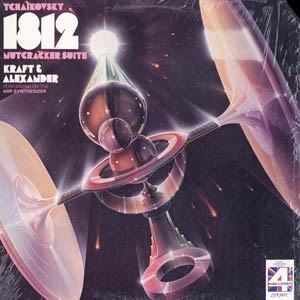
Tchaikovsky 1812 Nutcracker Suite (1977) by Kraft and Alexander
This is probably one of the most beautiful compositions of electronica from the 1970s. The album is very rare to find. The LP runs for 40 minutes. It is a remake of Tchaikovsky's Nutcracker Suite. Like many electronic musicians from this era, most of the music were remakes from great orchestral works. I don't have much to write about this, except that the music was based on the ARP 2000. It's one of those things you just have to give it a listen. It's a relic.
1812 Overture
The Nutcracker Suite Overture
March
Dance of the Sugar-Plum Fairy/Trepak - Russian Dance
Arabian Dance
Chinese Dance/Reed Flutes
Waltz of the Flowers
Tuesday, May 15, 2007
Ror-Shak
 Deep (2007) by Ror-Shak
Deep (2007) by Ror-ShakI was at the bookstore as a fellow curious being attempting to delve into areas no man has ever gone before. There was also a music section, and, being the great experimenter of all-time, I put on these clumsy headphones, and looked slightly to my left. A harmony of curves captured my eye. I then looked a little below to see the name, and it revved my curiosity ever more. The album cover was pretty neat. It seemed as though it was an inkblot test, or perhaps a musical synesthesia of lines. I haven't felt so relieved in hearing this album. It came to my mind of the trip-hop style of Massive Attack, and the chill-out of Thievery Corporation fused into one. Finally I had to purchase it. Oh it was a breath of fresh air indeed! It was a golden note that strung in my ear.
Ror-Shak is a group originally based in New York by Dj Stakka and Dj DB. It's no wonder there are allusions to Drum & Bass. The project, it seems, is supposed to have just a variety of singers. There are some instrumentals, but most contain a vocal artist. I should note that, at least in my copy, there is a misprint of having an extra "final track." Although the album is 56 minutes long, I have enjoyed the music.
On a side note, the name is a kind of homage to the Swiss Psychologist Hermann Rorshak, who invented the inkblot test.
You may check out some of their songs below. Have fun!
Ror-Shak is a group originally based in New York by Dj Stakka and Dj DB. It's no wonder there are allusions to Drum & Bass. The project, it seems, is supposed to have just a variety of singers. There are some instrumentals, but most contain a vocal artist. I should note that, at least in my copy, there is a misprint of having an extra "final track." Although the album is 56 minutes long, I have enjoyed the music.
On a side note, the name is a kind of homage to the Swiss Psychologist Hermann Rorshak, who invented the inkblot test.
You may check out some of their songs below. Have fun!
Lisa's Song feat. Lisa Shaw
Love & Pride feat. Wendy Starland
Wednesday, April 11, 2007
Apollo & Daphne
Phoebus is lovestruck; having seen the girl,
he longs to wed her and, in longing, hopes;
but though he is the god of oracles,
he reads the future wrongly. Even as,
when grain is harvested, the stubble left
will burn, or as the hedges burn when chance
has led some traveler to bring his torch
too close, or to forget it on the road
when he went off at dawn, so Phoebus burns,
so is his heart aflame; with hope he feeds
a fruitless love. He looks at Daphne's hair
as, unadorned, it hangs down her fair neck,
and says: "Just think, if she should comb her lock!"
He sees her lips and never tired of them;
her fingers, hands, and wrists are unsurpassed;
her arms--more than half-bare-- cannot be matched;
whatever he can't see he can imagine;
he conjures it as even more inviting.
But swifter than the lightest breeze, she flees
and does not halt--not even when he pleads:
"O, daughter of Peneus, stay! Dear Daphne,
I don't pursue you as an enemy!
Wait, nymph! You flee as would the lamb before
the wolf, the deer before the lion, or
the trembling dove before the eagle; thus
all flee from hostile things, but it is love
for which I see you now! What misery!
I fear you'll stumble, fall, be scratched by brambles
and harm your faultless legs--and I'm to blame.
You're crossing trackless places. Slow your pace;
I pray you, stay your flight. I'll slow down, too.
But do consider who your lover is.
I'm not a mountain dweller, not a shepherd,
no scraggly guardian of flocks and herds.
Too rash, you don't know whom you're fleeing from;
in fact, that's why you run. I am the lord
of Delphi's land, and Claros, Tenedos,
and regal Patara. Jove is my father.
Through me, all is revealed: what's yet to be,
what was, and what now is. The harmony
of song and lyre is achieved through me.
My shaft is sure in flight; but then there's he
whose arrow aimed still more infallibly,
the one who wounded me when I was free
of any love within my heart. I am
the one who has invented medicine,
but now there is no herb to cure my passion;
my art, which helps all men, can't hear its master."
He'd have said more, but Daphne did not halt;
afraid, she left him there, with half-done words.
But even then, the sight of her was striking.
The wind laid bare her limbs; against the nymph
it blew; her dress was fluttering; her hair
streamed in the breeze; in flight she was more fair.
But now the young god can't waste time: he's lost
his patience; his beguiling words are done;
and so--with love as spur-- he races on;
he closes in. Just as a Gallic hound
surveys the open field and sights a hare,
and both the hunter and the hunted race
more swiftly--one to catch, one to escape
(he seems about to leap on his prey's back;
he's almost sure he's won; his muzzle now
is at her heels; the other, still in doubt--
not sure if she is caught--slips from his mouth;
at the last instant, she escapes his jaws):
such were the god and girl; while he is swift
because of hope, what urges her is fear.
But love has given wings to the pursuer
he's faster--and his pace will not relent.
He's at her shoulders now; she feels his breath
upon the hair that streams down to her neck.
Exhausted, wayworn, pale, and terrified,
she sees Peneus' stream nearby; and cries:
"Help me, dear father; if the river-gods
have any power, then transform, dissolve
my gracious shape, the form that pleased too well!"
As soon as she is finished with her prayer,
a heavy numbness grips her limbs; thin bark
begins to gird her tender frame, her hair
is changed to leaves, her arms to boughs; her feet--
so keen to race before--are now held fast
by sluggish roots; the girl's head vanishes,
becoming a treetop. All that is left
of Daphne is her radiance.
And yet
Apollo loves her still; he leans against
the trunk; he feels the heart that beats beneath
the new-made bark; within his arms he clasps
the branches as if they were human limbs;
and his lips kiss the wood, but still it shrinks
from his embrace, at which he cries: "But since
you cannot be my wife, you'll be my tree.
O laurel, I shall always wear your leaves
to wreathe my hair, my lyre, and my quiver.
When Roman chieftains crown their heads with garlands
as chants of gladness greet their victory,
you will be there. And you will also be
the faithful guardian who stands beside
the portals of Augustus' house and keeps
a close watch on the Roman crown of oak leaves.
And even as my head is ever young,
and my hair ever long, may you, unshorn,
wear your leaves, too forever: never lose
that loveliness, o laurel, which is yours!"
Apollo's words were done. With new-made boughs
the laurel nodded; and she shook her crown,
as if her head had meant to show consent.
- from Metamorphoses, Part of "Apollo & Daphne" by Ovid (translated by Allen Mandelbaum)
Thursday, April 05, 2007
I'm Dreaming Tangerines
Tangerine Dream is a German electronica group formed in 1967. To write a full biography on them is too extensive for this post, so I shall only focus on the album.
This album is great. If you ever like Pink Floyd or Kraftwerk, I am sure you will dig this. The music is fully instrumental, the textures and atmospheres are given with such warmth and mystery. The album's title track "Force Majeure" runs for about 18 minutes and 23 seconds, but it's worth the listen. You will hear tender sounds of isolated strings mixed in with other electronic sound ensembles, as each track flows beautifully from one to the next. The album contains two other tracks: "Cloudburst Flight" and "Through Metamorphic Rocks." During this time, most electronic albums are only to be heard in-house, and thus the music is meant to be either ambient or remakes of classical music. Jean-Michelle Jarre, Isao Tomita, Robert Gleason, and Walter (Wendy) Carlos are other composers who contributed to this style of electronica. So give this track a try, even though it is long. But I'm sure the listen will be relaxing and fill you up with curiosity along the way.
This album is great. If you ever like Pink Floyd or Kraftwerk, I am sure you will dig this. The music is fully instrumental, the textures and atmospheres are given with such warmth and mystery. The album's title track "Force Majeure" runs for about 18 minutes and 23 seconds, but it's worth the listen. You will hear tender sounds of isolated strings mixed in with other electronic sound ensembles, as each track flows beautifully from one to the next. The album contains two other tracks: "Cloudburst Flight" and "Through Metamorphic Rocks." During this time, most electronic albums are only to be heard in-house, and thus the music is meant to be either ambient or remakes of classical music. Jean-Michelle Jarre, Isao Tomita, Robert Gleason, and Walter (Wendy) Carlos are other composers who contributed to this style of electronica. So give this track a try, even though it is long. But I'm sure the listen will be relaxing and fill you up with curiosity along the way.
Tangerine Dream - Force Majeure
Monday, March 26, 2007
Contempt
 Le Mépris (Contempt) (1962) directed by Jean-Luc Godard
Le Mépris (Contempt) (1962) directed by Jean-Luc GodardIf I had my sweetheart, that sunshine in my life, the dimple of my smile, the color of my eye, the sugar in my coffee, the apple of my tree, that song of my bluejay, the herb for my tea, thanks to her mother's fruit, and her father's vanilla twinky, I would take my darling bubblegum to watch this depressing film with me. Oh and that was a compliment for the film, for sure. You will know exactly what not to do about love after you watch this film. You will walk out of the room speechless, almost giving up on your faith towards that special little someone, out-there, to give you that perfect, symmetrical smile to change your life.
The story deals with a French playwright, Paul, who is married to the beautiful and tender Camille. Paul becomes involved with the movie industry and meets a rich American producer by the name of Prokosch. The famous movie director, Fritz Lang (as himself), was originally offered to work for the producer in hopes to create a retelling of Homer's great epic story, The Odyssey. Not too happy with Lang's interpretation, Prokosch turns to Paul and hires him to rewrite the script, offering Paul a gamble. The financially rich and perverse Prokosch begins to admire Camille, and tells Paul either to give up his wife to get paid for the job, or lose the job and keep her. Paul, knowing that he wants to keep his flat with his wife, accepts the monetary offer to literally give his wife to the sick producer, until he regrets the downfall of what was once a loving relationship.
You must have patience to sit through the film. There is a very long 45-minute sequence inside of the apartment of argument and discussion between the husband and his wife, but the camera movements are seemless. Most of the time they are trying to understand each other. I noticed when situations are warped because of that emotional bond, emotions distract that reasonable state of mind. That is, when two people are thoughtful by their emotions, they get cloudy to each other, and they leave no room for making the right choices. Paul kept on trying to let Camille express her sudden change towards him, but unfortunately she had been keeping her concerns to herself, letting her husband admit what he did wrong earlier in the day. You can feel her heartbreak, her faith crumbling down on her from one minute to the next, from pure happiness to melancholic distress.
The movie is extremely sad and depressing. You feel for the characters' pain and suffering. The dialogue is subtle but well-written and extensive. The arguments between the couple are disturbing, although not explicitly, since the viewer can feel the deterioration becoming heavier and heavier, as Paul urges her to say why she changed. When she decides to tell him, the change to revive their love was too late.
I can only sigh after writing this. Just to remember the film gets me sad to think I might be lonely for the rest of my life. Being responsible for your love to someone is difficult, and sometimes we want to escape from it because we don't want to be held responsible for whatever decision we make. Yet since we are people, there is always a second chance depending on how harmless the effects of the decision are. In Paul's case, what he did was unforgivable, yet it was also the clarity of the situation to each other that might have made the movie end on a lighter note.
To brighten up this post, here is a song by the Brazilian singer Astrud Gilberto.
The story deals with a French playwright, Paul, who is married to the beautiful and tender Camille. Paul becomes involved with the movie industry and meets a rich American producer by the name of Prokosch. The famous movie director, Fritz Lang (as himself), was originally offered to work for the producer in hopes to create a retelling of Homer's great epic story, The Odyssey. Not too happy with Lang's interpretation, Prokosch turns to Paul and hires him to rewrite the script, offering Paul a gamble. The financially rich and perverse Prokosch begins to admire Camille, and tells Paul either to give up his wife to get paid for the job, or lose the job and keep her. Paul, knowing that he wants to keep his flat with his wife, accepts the monetary offer to literally give his wife to the sick producer, until he regrets the downfall of what was once a loving relationship.
You must have patience to sit through the film. There is a very long 45-minute sequence inside of the apartment of argument and discussion between the husband and his wife, but the camera movements are seemless. Most of the time they are trying to understand each other. I noticed when situations are warped because of that emotional bond, emotions distract that reasonable state of mind. That is, when two people are thoughtful by their emotions, they get cloudy to each other, and they leave no room for making the right choices. Paul kept on trying to let Camille express her sudden change towards him, but unfortunately she had been keeping her concerns to herself, letting her husband admit what he did wrong earlier in the day. You can feel her heartbreak, her faith crumbling down on her from one minute to the next, from pure happiness to melancholic distress.
The movie is extremely sad and depressing. You feel for the characters' pain and suffering. The dialogue is subtle but well-written and extensive. The arguments between the couple are disturbing, although not explicitly, since the viewer can feel the deterioration becoming heavier and heavier, as Paul urges her to say why she changed. When she decides to tell him, the change to revive their love was too late.
I can only sigh after writing this. Just to remember the film gets me sad to think I might be lonely for the rest of my life. Being responsible for your love to someone is difficult, and sometimes we want to escape from it because we don't want to be held responsible for whatever decision we make. Yet since we are people, there is always a second chance depending on how harmless the effects of the decision are. In Paul's case, what he did was unforgivable, yet it was also the clarity of the situation to each other that might have made the movie end on a lighter note.
To brighten up this post, here is a song by the Brazilian singer Astrud Gilberto.
Goodbye Sadness (Tristeza)
Tuesday, March 20, 2007
House of Leaves
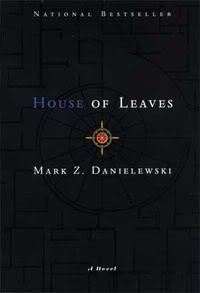 House of Leaves (2000) was written by Mark Z. Danielewski. It has been described that in the early stages of the book it began circulating from drug addicts to porn actors as a stack of loosely binded sheets. It has been considered as "One of the most ambitious, complicated, and eagerly anticipated literary debuts of the year" said Newsweek. It is an amazing novel of mystery, science-fiction, and horror all wrapped into one plot.
House of Leaves (2000) was written by Mark Z. Danielewski. It has been described that in the early stages of the book it began circulating from drug addicts to porn actors as a stack of loosely binded sheets. It has been considered as "One of the most ambitious, complicated, and eagerly anticipated literary debuts of the year" said Newsweek. It is an amazing novel of mystery, science-fiction, and horror all wrapped into one plot.The story is narrated by Johnny Truant. He is a tattooist living in the dark city of Los Angeles. He tries to find an apartment with his friend Lude and they learn that an old man, named Zampanò, recently died in his home. While looking through the apartment, they discover a manuscript. The manuscript is a research essay written by Zampanò on a series of documentaries put into one film by the genius director Will Navidson called The Navidson Record. Throughout the manuscript, it details how Will Navidson and his family began to live in a house where, in a normal afternoon, found that the inside was bigger than the outside, which lead the family into relationship complications. This event filled Navidson and his group of friends with curiosity to explore the house to encounter and film many strange incidents.
The novel is a play on the academic format standards in the English language. It is highly experimental, in that you will see footnotes within footnotes, an exhaustive and invented bibliography for the most part, typographical layouts are brilliantly placed unconventionally and progressively as you immerse yourself within the story, and stories from different points of view crossing each other as one comment or complement the other.
House of Leaves is a wonderful serenade to language. From each point of view the dialects radically change , and the novel flips many times from the gritty, dirty-mouthed Truant to an academic Zampanòian writing, leaving you with the impression of movement. You must have a good amount of ADD to enjoy it since it is highly detailed in describing normal, everyday things. There are many sections that are simply adding "notes" to certain texts (even invented ones), pages devoted to four-word sentences, and extended comments about a particular idea relating inside of the plot, as well as outside of it.
I recommend this book to anyone who will enjoy the dark and twisted perils literature can bring to the reader, especially with the innovative approach to the novel that Danielewski took.
Sigur Ros - Agaetis Byrjun
Subscribe to:
Posts (Atom)

